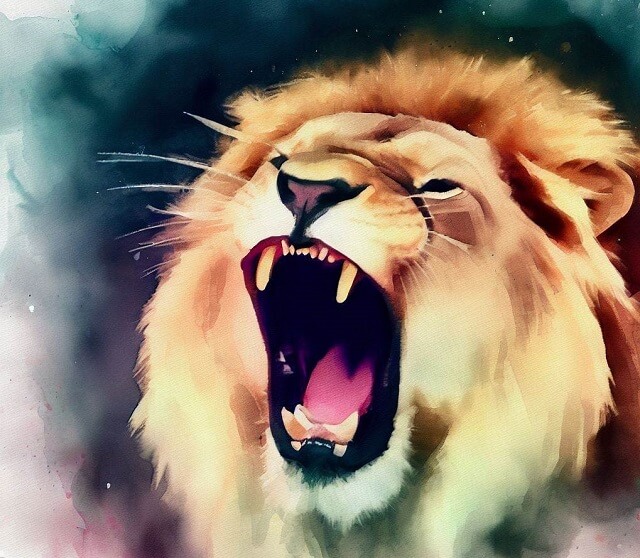
Anguished Roars
All over the world there are flourishing Jewish communities, blessed with thriving synagogues, bustling schools, and prominent yeshivot. But with all of this Torah study and mitzvah-observance, do we feel the absence of the Beit HaMikdash? Are we aware of our state of exile and dispersion?
The anguished roars of a lion — that is how the prophet describes God’s constant grief over the loss of the Holy Temple: “God roars from on high; He calls out from His holy dwelling, roaring over His habitation” (Jeremiah 25:30).
The Sages were able to hear these roars and translate them for us:
“Woe to My children! On account of their sins, I have destroyed My House and set fire to My sanctuary and exiled them among the nations of the world.” (Berachot 3a)
Three Watches
The Rabbis also knew at what hour these heavenly cries may be heard. These roars, they taught, take place during the three watches of the night. (The darkness of night is a common metaphor for the exile.) And there are even signs that indicate the exact time of these anguished cries:
“The night consists of three watches, and during each watch the Holy One sits and roars like a lion.... The sign for this: in the first watch, a donkey brays; in the second, dogs howl; and in the third, a baby nurses from its mother and a woman converses with her husband.”
What is the meaning of these strange signs — donkeys braying, dogs howling, babies nursing, and early-morning conversations?
The Flawed Service of Israel in Exile
We must first understand the significance of these night watches. The watches are a metaphor for underlying spiritual mechanisms in the universe. Each watch corresponds to the elevation of higher realms, an elevation that is a result of Israel’s service of God in this world. Since the Temple’s destruction and the exile of Israel, however, the Jewish nation has been reduced to an atrophied spiritual life. This decline has diminished the overall level of Divine providence in the world. The roars of heavenly anguish during the night watches are an expression of the cosmic pain caused by this spiritual decline.
Why are there three watches? The three watches correspond to the three basic levels in which we serve God: (1) through our actions, (2) by refining our character traits, and (3) by deepening our understanding and knowledge. Sadly, all three aspects have been adversely affected by the exile and the absence of the Beit HaMikdash.
Deeds and Traits
The first form of serving God is through deeds and actions. When the Jewish people are on an elevated spiritual plane, their mitzvot and acts of kindness are guided by a profound awareness of God’s presence. Due to the detrimental influences of exile, however, all of our actions are tainted by an overall atmosphere of self-centeredness and materialism. This causes our service of God to lose its reparative quality of tikkun. Lacking the guidance of Divine wisdom, materialistic tendencies are reinforced. This phenomenon is particularly apparent regarding mitzvot that involve physical pleasures, such as the mitzvah to rejoice on the holidays.
For this reason, the sign of the first watch is the braying of a donkey (in Hebrew, chamor), indicating the awakening of materialistic tendencies (chomriut). This is a basic aspect of human nature — “For man is born a wild donkey” (Job 11:12) — that is bolstered by the negative influences of exile and its limited spiritual life.
The second night-watch corresponds to our service of God through the acquisition of positive character traits, such as kindness, generosity, and humility. The current state of the world, however, with its lack of holy influences, fosters various negative traits. This is not due to the body’s physicality but rather because we lack an accurate image of pure and refined traits, as we are unable to faithfully model ourselves after God’s traits of kindness and compassion.
The sign for the distortion of this service is the howling of dogs. Dogs symbolize negative traits, especially insolence (see Isaiah 56:11). Greed and brazenness are the source for many other flawed traits.
Service of the Intellect
The final watch corresponds to the highest form of serving God — using our cognitive powers. There are two levels in this avodah: those who study Halachah and the revealed parts of Torah, and those who delve into deeper esoteric studies. Unlike the service of God in actions and character traits, Torah learning cannot be debased. As the Sages taught, “Words of Torah cannot contract ritual impurity” (Berachot 22a). Therefore the signs of the third watch are positive ones, signs of Divine intimacy and beneficence — a baby nursing and a wife conversing with her husband.
However, even this level is detrimentally influenced by the exile. What is the heavenly sign for those who study the revealed parts of Torah? “A baby nursing from its mother.” This indicates a state that is incomplete, an intellectual service not fully developed; it is therefore symbolized by a nursing baby.
Those who study on a deeper level, contemplating the nature of God with philosophical and mystical inquiries, are blessed with a revealed love of God. The sign for this level is one of love and affection — “a woman conversing with her husband.” Nonetheless, even this holy service appears to be deficient, as the Sages described it as a ‘conversation’ (mesaperet), the relating of stories without deeper and truer content. Once again, this state is due to our current lack of Divine inspiration and prophetic wisdom.
(Silver from the Land of Israel. Adapted from Ein Eyah vol. I on Berachot 3a (1:6).)





